|
|
|
Sort Order |
|
|
|
Items / Page
|
|
|
|
|
|
|
| Srl | Item |
| 1 |
ID:
119621
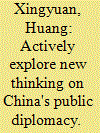

|
|
|
| 2 |
ID:
172979
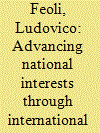

|
|
|
|
|
| Summary/Abstract |
Ludovico Feoli comments on a small Central American state’s approach to maximising its international diplomatic projection.
|
|
|
|
|
|
|
|
|
|
|
|
|
|
|
|
| 3 |
ID:
123644
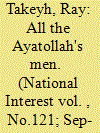

|
|
|
|
|
| Publication |
2012.
|
| Summary/Abstract |
MORE THAN thirty years after Ayatollah Ruhollah Khomeini came to power-and two decades after his passing-the Islamic Republic remains an outlier in international relations. Other non-Western, revolutionary regimes eventually eschewed a rigidly ideological foreign policy and accepted the fundamental legitimacy of the international system. But Iran's leaders have remained committed to Khomeini's worldview. The resilience of Iran's Islamist ideology in the country's foreign policy is striking. China's present-day foreign policy isn't structured according to Mao's thought, nor is Ho Chi Minh the guiding light behind Vietnam's efforts to integrate into the Asian community. But Iran's leadership clings to policies derived largely from Khomeini's ideological vision even when such policies are detrimental to the country's other stated national interests and even when a sizable portion of the ruling elite rejects them.
|
|
|
|
|
|
|
|
|
|
|
|
|
|
|
|
| 4 |
ID:
123646


|
|
|
| 5 |
ID:
155351
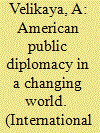

|
|
|
|
|
| Summary/Abstract |
TODAY, many countries rely on public diplomacy (PD) when dealing with expert communities and civil society in other countries: foreign policy is growing increasingly personalized all over the world making PD dealing with specific circles of foreign audiences a useful and very much needed instrument.
|
|
|
|
|
|
|
|
|
|
|
|
|
|
|
|
| 6 |
ID:
111636
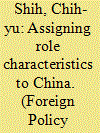

|
|
|
|
|
| Publication |
2012.
|
| Summary/Abstract |
This paper distinguishes and integrates national identity and national image through a deep role analysis. It argues that the meaning of China's rising rests upon the views of those who evaluate China's role playing. This role analysis mediates between international relations and Chinese foreign policy. It also mediates between China watchers and their China. The two dimensions of role-role taking and role making-generate four different discursive approaches to interpreting the rise of China, each in its own way associated with the affects of opportunity and threat. They are "nation state,""civilization,""Tianxia," and "Asianism." In response to the external view on the rise of China, Chinese narrators often take the Tianxia and nation state approaches as components of their conception of national role. These conceptions mediated by role-making and role-taking, evolve into four possible strategic focuses-national interests, imperialism, sovereignty and center-periphery. While this last strategic focus on role-taking has recently attracted enthusiastic response in China, it has been re-appropriated by social science concepts such as soft power and social capital that assume an egoistic role-making China is on the move.
|
|
|
|
|
|
|
|
|
|
|
|
|
|
|
|
| 7 |
ID:
114822
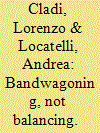

|
|
|
|
|
| Publication |
2012.
|
| Summary/Abstract |
Although realist perspectives seem challenged to explain European choices and preferences, realism retains great utility with its stress on states and states' concern for their national interests. Traditional realist analysis of European security policy err, rather, by focusing on balancing and related concepts such as soft balancing and balancing for autonomy. These accounts are theoretically and empirically flawed. Whilst balancing perspectives shed some light on European security policy predispositions, bandwagoning better explains trans-Atlantic contemporary security cooperation and increases the explanatory power of realist theories. The case for European bandwagoning is illustrated here by the empirical experience of prominent European Union military initiatives and the French defence reforms in the post-Cold War period. The tendency to bandwagon shows that European attempts to increase capabilities are strengthening rather than weakening transatlantic ties. Contrary to dominant realist views, through bandwagoning NATO benefits from European security and defence policy, becoming more durable and stronger than traditional realism expects.
|
|
|
|
|
|
|
|
|
|
|
|
|
|
|
|
| 8 |
ID:
120819
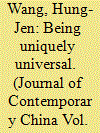

|
|
|
|
|
| Publication |
2013.
|
| Summary/Abstract |
In this paper I address the question of how Chinese scholars participate in scientific knowledge production by appropriating Western IR theories, primarily by examining interactions between North American theories that claim universality and China-specific IR efforts. Drawing on post-Mao era publications and books, I discuss how increasingly independent Chinese IR scholars are portraying their country's rising status in international politics and identifying China's national interests, while still emphasizing socialist concepts such as anti-hegemonism. The result is a form of Chinese IR scholarship that combines Western IR language with a worldview that emphasizes a modern China within the context of traditional socialist foreign policy norms. I will argue that Chinese scholarly discussions about IR theory building reflect efforts to present 'their rising China' (as individually perceived) in the study, research, and development of IR theory in response to the appearance of modern IR methods that require new definitions and new roles for old socialist forms. In this context, identity concerns are more important than the actual theories being established or appropriated.
|
|
|
|
|
|
|
|
|
|
|
|
|
|
|
|
| 9 |
ID:
163416
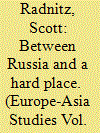

|
|
|
|
|
| Summary/Abstract |
This essay asks how Central Asian states have responded to Russia’s intervention in Ukraine and salvos against the West, as a means to assess how Russia and the Central Asian states understand their national interests and exercise state power. It argues that the post-Soviet region shares a cynical and geopolitically driven view of the exercise of global power. Yet Russia has sometimes deployed its resources to advance short-term ideological objectives, whereas Central Asian foreign policy is pragmatic and opportunistic. The Ukraine crisis threatened to coerce the Central Asian states into conformity with Russia’s interests; ironically, their dependence on Russia has enabled their freedom of action in foreign policy, within limits. The essay highlights the ways that geography enables and constrains the execution of foreign policy, and considers the ambiguous role ideology plays in the formulation of national interests and the prospects for international cooperation.
|
|
|
|
|
|
|
|
|
|
|
|
|
|
|
|
| 10 |
ID:
153603
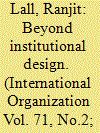

|
|
|
|
|
| Summary/Abstract |
International organizations (IOs) have long been a central focus of scholarship in international relations, yet we know remarkably little about their performance. This article offers an explanation for differences in the performance of IOs and tests it using the first quantitative data set on the topic. I argue that the primary obstacle to effective institutional performance is not deviant behavior by IO officials—as conventional “rogue-agency” analyses suggest—but the propensity of states to use IOs to promote narrow national interests rather than broader organizational objectives. IOs that enjoy policy autonomy vis-à-vis states will thus exhibit higher levels of performance. However, in the international context policy autonomy cannot be guaranteed by institutional design. Instead, it is a function of (1) the existence of (certain types of) institutionalized alliances between IOs and actors above and below the state; and (2) the technical complexity of IO activities. I provide empirical evidence for the argument by constructing and analyzing a cross-sectional data set on IO performance—based in part on a new wave of official government evaluations of IOs and in part on an original survey of IO staff—and conducting a comparative case study in the realm of global food security.
|
|
|
|
|
|
|
|
|
|
|
|
|
|
|
|
| 11 |
ID:
081744


|
|
|
|
|
| Publication |
2008.
|
| Summary/Abstract |
International economic power (the ability to shape rules of global economic conduct) needs to be understood in terms of the interactions between rule-makers and rule-takers in the global economy. Attempts to reshape development paradigms through interventions during financial crisis have been highly significant for the domestic political economy of the developing world. In the 1980s and early 1990s, the primary question was how much countries would liberalize in response to financial crisis. Reactions to the crises of the late 1990s in Asia and Latin America were more varied. This article explores domestic political responses to crises in both regions in the 1980s and late 1990s. It argues that countries are finding it increasingly difficult to trump domestic political pressure for change with arguments about technocratic necessity. Popular pressure is pushing governments into new experiments in economic nationalism, not a radical rejection of global economic integration, but a reshaping of relationships in an attempt to secure national interests and, in some cases, to devote more resources to welfare. Experiments to date are modest, but could presage more significant change in the future
|
|
|
|
|
|
|
|
|
|
|
|
|
|
|
|
| 12 |
ID:
115045
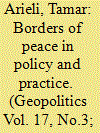

|
|
|
|
|
| Publication |
2012.
|
| Summary/Abstract |
Border-management policies are designed to balance national interests of border control with the costs of monitored cross-border interaction. These policies, formulated by national authorities, are often based on constructed definitions and interests of national security rather than wider understandings of the components of human security. This is especially evident in post-conflict borders where local initiatives of economic, social and environmental cross-border interaction are posed to contribute to regional stability and security. This article analyzes civilian cross-border cooperation in the southern section of the Israel-Jordan border region, distinguishing between local and national perspectives regarding border management. Focusing mainly on Israel's policies the article demonstrates how despite the vision of good neighbourly relations and their potential contribution towards regional prosperity and stability, local cross-border initiatives have been inhibited in the name of national security. The case study demonstrates the mechanisms and ramifications of exclusive securitisation policies of post-conflict border management.
|
|
|
|
|
|
|
|
|
|
|
|
|
|
|
|
| 13 |
ID:
170762
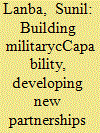

|
|
|
|
|
| Summary/Abstract |
The strategic need for nations to protect and promote their national interest in a changing world order has been the centre piece of global strategic discourse for some time. Linked to this aspect of national interest is the need to build military capability to prepare for the array of security challenges that lie ahead and also developing new partnerships, as the global order shifts from a unipolar model to a multipolar one. There is little dispute over the assertion that the world today is characterised by multi-layered and multi-faceted diversity from political, demographic, economic, environmental and strategic viewpoints. These issues are important from strategic perspective largely because it seems that the world is in another period of historical transition. It would be a fair assumption that we are living through a period of ‘strategic uncertainty
|
|
|
|
|
|
|
|
|
|
|
|
|
|
|
|
| 14 |
ID:
140408
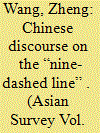

|
|
|
|
|
| Summary/Abstract |
This article surveys the discussion and debate in China over the nine-dashed line in recent years, with special focus on the efforts of scholars and think-tank experts to legitimize the nine-dashed line and their interactions with the Chinese public and policymakers through public media.
|
|
|
|
|
|
|
|
|
|
|
|
|
|
|
|
| 15 |
ID:
140325
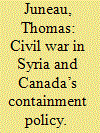

|
|
|
|
|
| Summary/Abstract |
The civil war in Syria has caused the deaths of more than 230,000 civilians and combatants, has led to one of the largest refugee crises in recent memory, and has destabilized the Levant. It therefore represents an extraordinarily challenging foreign policy conundrum. A wide variety of responses—ranging from the imposition of no-fly zones to doing nothing—have been considered in Ottawa and in allied capitals since 2011. Each one, however, raises potentially significant challenges.
This article explores how Canada has considered those alternatives. As is systematically the case for a non-great power, Canada’s policy options were shaped more by deliberations in allied capitals—especially Washington—and only thereafter by actual developments in Syria. After laying out Canada’s interests relative to the war in Syria, the article describes four policy alternatives that Canada has faced since 2011, as seen through the lenses of liberal pacifism, liberal interventionism, isolationism, and containment. Among this menu of deeply flawed options, containment has steadily emerged as Canada’s de facto approach. That approach has been correct: it is the least bad course of action available since it best allows Ottawa to protect and promote its interests. Nevertheless, Canada could take additional steps to implement a more comprehensive containment framework.
|
|
|
|
|
|
|
|
|
|
|
|
|
|
|
|
| 16 |
ID:
129636
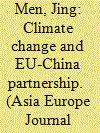

|
|
|
|
|
| Publication |
2014.
|
| Summary/Abstract |
Both the EU and China are important participants in the United Nations Framework Convention on Climate Change and the Kyoto Protocol. The EU's reliance on legally binding rules and institutions demonstrates its strong belief on institutionalism. While interstate cooperation is certainly necessary, implementation of any international agreement and most of the work needs to be done within a state. Henceforth, an uneasy balance between national interests and international responsibility has to be maintained. In the case of EU-China partnership, the carbon aviation tax issue serves as a good example to examine the realist-institutionalist struggle. Although it is still too early to tell if the EU and China would overcome their major disagreements in the field of climate change, there is reason to believe that an international agreement may be reached by 2015.
|
|
|
|
|
|
|
|
|
|
|
|
|
|
|
|
| 17 |
ID:
129664
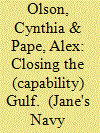

|
|
|
| 18 |
ID:
098736
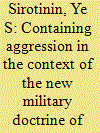

|
|
|
| 19 |
ID:
148535
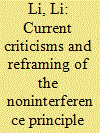

|
|
|
|
|
| Summary/Abstract |
The “Five Principles of Peaceful Coexistence” was born against the background of poverty, powerlessness and humiliation. It became the guiding principle of China`s foreign policy since it was first proposed in 1953. However, several reasons led to increasing criticisms of it, especially regarding the noninterference principle. These reasons include the economic interdependence and blurring of boundaries in a globalized world, the rise of China`s power, and China`s extending overseas interests. The criticisms are reflected in three aspects: whether sovereignty allows for humanitarian intervention against the background of proliferating international human rights norms; whether China`s behavior obeys the noninterference principle; and whether this principle can serve China`s national interests. Chinese scholars respond to these criticisms in terms of three aspects: the noninterference principle should be flexibly interpreted depending on the specific background; many alternate terms of the principle like “creative involvement,” “constructive intervention,” and “participatory advocacy” were put forward; China`s sticking to the fundamental sovereignty principle has never changed. It is sensible and necessary for China to reframe the noninterference principle based on analysis from international, regional and domestic levels. This reframing should protect China`s national interests while matching the image of “responsible great power.”
|
|
|
|
|
|
|
|
|
|
|
|
|
|
|
|
| 20 |
ID:
186603
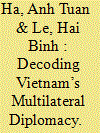

|
|
|
|
|
| Summary/Abstract |
This article explains Vietnam’s recent proactive approach to multilateral diplomacy, defined as diplomatic performance in multilateral institutions. It argues that Hanoi’s embrace of multilateral diplomacy is best explained through the lens of national interests. Vietnam has consistently placed its foreign policy in the broader dynamics of international politics. Since Ho Chi Minh, the founding father of the nation, started his struggle for the national liberation of Vietnam, multilateral institutions have been perceived as one important direction to raise Vietnam’s voice and gather supports from the international community to serve the country’s utmost interest of gaining national independence. After the independent state of Vietnam was established, Hanoi continued to pursue multilateral diplomacy to advance Vietnam’s national interests of defending the country’s security, advancing socio-economic development, and improving its role and stance in the international community. This approach is particularly hailed in recent years as a way to avoid becoming a proxy to big power competition, to mitigate significant security challenges, and to sustain economic development.
|
|
|
|
|
|
|
|
|
|
|
|
|
|
|
|
|
|
|
|
|